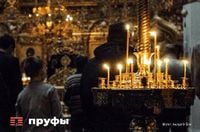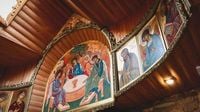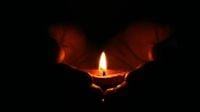As Orthodox Christians prepare for Easter, the significance of Great Saturday, which falls on April 19, 2025, cannot be overstated. This day marks the end of Great Lent, a period of fasting and spiritual reflection that lasts for seven weeks. It is a time dedicated to mourning and remembrance, as believers reflect on the burial of Jesus Christ and anticipate His resurrection.
On Great Saturday, churches around the world will be filled with worshippers dressed in bright clothing, as it is customary to wear such attire on this significant day. Priests will perform special services, consecrating kulich—traditional Easter cakes—and other festive foods, as reported by Zakon.kz. The atmosphere is one of solemnity mixed with a sense of joyous anticipation for the celebration of Easter.
Folk beliefs surrounding Great Saturday add a layer of cultural significance to the day. It is said that the weather on this day can predict the climate for the coming months. For instance, if the day is warm and clear, it is believed that summer will be hot. Conversely, a rainy day may indicate a cooler season ahead. Another common belief warns against lending or giving away household items to strangers, as this could bring misfortune and loss of health.
While the day is steeped in tradition, there are specific customs that dictate what can and cannot be done. Activities such as engaging in physical labor, cleaning the house, or even washing clothes are strictly prohibited, as they are thought to disturb the sacred nature of the day. Instead, believers are encouraged to focus on spiritual preparation through prayer, scripture reading, and participation in church services.
Father Antoniy Rusakevich, a priest who shares insights on his channel, emphasizes the importance of this day: “Every day of Holy Week has its special significance. Saturday is dedicated to the remembrance of Jesus Christ's burial and His descent into hell.” This day serves as a bridge between the sorrow of Good Friday and the joy of Easter Sunday, where Christians celebrate Christ’s victory over death.
Food customs also play a vital role on Great Saturday. Although fasting continues, there is some leniency, allowing believers to consume hot food without oil. Simple foods such as bread, fruits, and vegetables are typically part of the diet, while alcohol is strictly avoided. For those planning to partake in communion, it is essential to observe the Eucharistic fast, which requires abstaining from food and drink after 6 PM.
As the day progresses, the atmosphere shifts toward preparation for the upcoming Easter celebrations. In homes across the Orthodox community, families are busy finalizing their holiday preparations. This includes the decoration of kulich and eggs, which are often dyed red to symbolize the blood of Christ. Many families also adhere to the tradition of not using needles or scissors on this day, believing that doing so could bring harm to the memory of the Savior’s suffering.
Great Saturday is also a time for reflection on nature and its signs. Observing the weather on this day is a tradition, with clear skies suggesting a bountiful summer harvest, while rain is seen as a harbinger of a fruitful spring. Believers often listen closely to the sounds of birds, interpreting their songs as omens of the coming warmth.
In addition to these customs, there is a significant emphasis on maintaining a peaceful and contemplative environment. Loud conversations, laughter, and music are discouraged, as this day is meant for quiet reflection and spiritual preparation. Conflicts and harsh words are particularly inappropriate, as the focus should be on preparing the soul for the joyous celebration of Easter.
As the sun sets on Great Saturday, the anticipation builds for the Easter Vigil, where the resurrection of Christ will be celebrated with great fervor. The night will be filled with the sounds of hymns and prayers, culminating in the joyous proclamation of “Christ is risen!” This moment is the highlight of the Christian calendar, symbolizing hope and renewal.
In Kazakhstan, a notable event will take place as the Holy Fire from the Church of the Holy Sepulchre in Jerusalem arrives at the Ascension Cathedral in Almaty on the evening of April 20, 2025. This arrival will further enrich the Easter celebrations, as congregants gather to receive this sacred flame, which symbolizes the light of Christ.
As Great Saturday approaches, Orthodox Christians are reminded of the importance of this day—not just as a time of preparation, but as a moment to reflect on the deep spiritual significance of the Easter season. It is a day that encapsulates the transition from mourning to joy, from darkness to light, and from death to resurrection.
In conclusion, Great Saturday is a profound day for Orthodox Christians, filled with rich traditions and spiritual significance. As they prepare for Easter, believers are encouraged to focus on their faith, engage in meaningful practices, and cherish the communal aspects of their worship. This day serves as a reminder of the hope and renewal that Easter brings, inviting all to partake in the joy of the resurrection.







